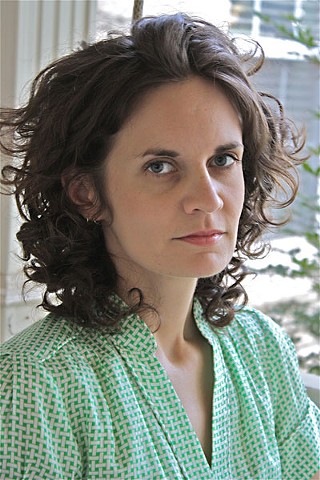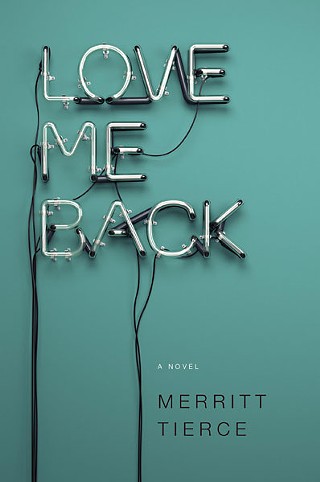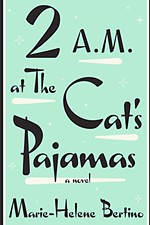Self Service
Merritt Tierce drew on her own time waiting tables for the provocative restaurant world in her novel Love Me Back
By Amy Gentry, Fri., Oct. 24, 2014
Cutting through the current cloud of romanticism surrounding food culture, Merritt Tierce's fearless debut novel Love Me Back is an unsentimental meditation on the transactional nature of love, desire, and food. It's also as juicy as a Wagyu steak. Our October #ACreads pick, Love Me Back, draws heavily from Tierce's own experiences waiting tables in the high-end Dallas steakhouse Nick & Sam's. As Marie, a single mother and career waitress, struggles to reconcile her identity as a mother with feelings of guilt and despair, she self-medicates with drugs, sex, and humiliation. It's dark, funny, and utterly gripping.
Tierce is fearless in more ways than one: She recently penned a clear-eyed op-ed about her abortions in The New York Times and weathered attacks from the right after revealing that she once donated $4,000 in tips from Rush Limbaugh to the Texas Equal Access Fund. (She went on to serve as executive director of the organization, but recently stepped down to write full time.) We spoke to Tierce about restaurants, motherhood, and masochism in Love Me Back.
Austin Chronicle: I worked in restaurants for years. I didn't know when I picked up your book that I was going to dive into immersive restaurant memories.
Merritt Tierce: I don't know whether to say I'm sorry for that.
AC: The trauma was strangely enjoyable. What is it about waiting tables that makes for such good stories?
MT: I've thought a lot about that. I feel like it has a lot to do with appetites. It's a stage, a setting for people to interact in a scripted way. But you can't really predict what's going to happen. There's something about it that's so animal – people eating food, and other people bringing people food to eat. There's a lot of ritual involved, and any time you have rituals and strangers interacting, if you don't end up with a story, it's rare.
AC: The industry attracts such characters. Aside from the customers, who all kind of blend together, it's the characters behind the scenes who are incredibly vivid and intense.
MT: I think you have to be a little fringe-y, to be willing to put yourself in the position of subservience that waiting tables requires. For a lot of people, that's just not a role they can fill. But people who wait tables have decided that they can simultaneously suppress their own identity enough to play that role, but also hold on to it enough to make it worthwhile. I think that is one reason that you end up with a lot of characters. But I also think it has something to do with the fact that it's a flexible job, one you can get in a lot of different places, and you don't need any skills beyond what you've gained in your experience in restaurants. So it's a good source of money for writers and artists and painters, anyone who has any other passion or focus in life and a hard time finding a mainstream way to support that habit.
AC: What drew you to restaurants?
MT: Desperation. I just needed a job. I had a bachelor's degree, but a bachelor's degree, even 15 years ago, was not worth a whole lot. And it was in English. I was 19, and I had two babies. Well, my first restaurant job, I didn't – but the reason I kept working in restaurants was that was the job I could get. Of the jobs I could get, it paid the best. I could have a flexible schedule and make some money. Then I kept doing it because it just takes so much time and effort to get yourself a foothold if you don't have one. I don't think I could have continued working at a place like Chili's or Olive Garden for 10 or 12 years, but I kept moving to restaurants with higher price points, and different things came with that. The more expensive the restaurant, the more money I made, of course, but also I ended up with stronger friendships and a deeper connection to the place. That doesn't have to do with the expense of the food, but in the high-dollar restaurant, a lot of times they're important to someone. The people who started the restaurant, it's their livelihood and profession. It's a little less of an airport in life.
AC: Your main character has kind of a love-hate relationship with restaurant work. She describes an environment that's very misogynistic and sometimes hostile and exploitative. But she needs it for some reason. I'm really interested in that aspect of the book.
MT: It definitely has a lot in common with my experience. It is absolutely exploitative, and the culture in the book is really misogynistic. But the character Marie has some kind of masochistic tendencies to begin with. Some part of her just wants to prove to herself that she can survive and even thrive in that hostile environment. A lot of the hostility is specifically focused on women, and I think that brings out a real stubbornness in her. She wants to see it and acknowledge that it's happening, and also not let it keep her from getting what she needs to get out of it, which is money. She also needs to feel like she's good at something, as most people do. There's one point where her daughter is saying she wants to work in a restaurant when she grows up, and obviously it's not what Marie wants for herself or her daughter. But she does value it for the time being. It gives her an income and a place to go every day and be confident.
AC: It seems like the book both is and is not about motherhood. It's at the center of her story, her young pregnancy and her relationship with her daughter. But we spend so much more time in the restaurant than with her daughter, like she does. What was the importance of her relationship with her daughter? Was that the central thing for her?
MT: For her character, the central thing is herself, and her sense of self – her deep, ongoing struggle to find something to live for and figure out who she is. Her daughter is, of course, a very large piece of that and affects all of the choices that she makes, even if they're selfish choices. You're right that the book spends more time in the restaurant than with her daughter, but she's always thinking about what it means that she has this beautiful, dependent human that she doesn't instinctively know how to relate to, or how to be with, or how to raise. And what it means that she's also choosing to go into the restaurant every night instead of some other thing, instead of being a secretary and coming home every night, instead of living with her parents. She's very aware that she has set her life up in a way that dramatically excludes her daughter from a lot of it. That also gives her the space she needs to figure out how to relate to her daughter in a way that she feels is authentic, and is not just someone else's idea of what motherhood looks like.
Merritt Tierce will appear on the Texas Book Festival panel "Autobiographical Fiction" with Lola Lafon and Sergio Troncoso Saturday, Oct. 25, 3:15pm, in Capitol Extension Rm. E1.026. For more info, visit www.texasbookfestival.org.














